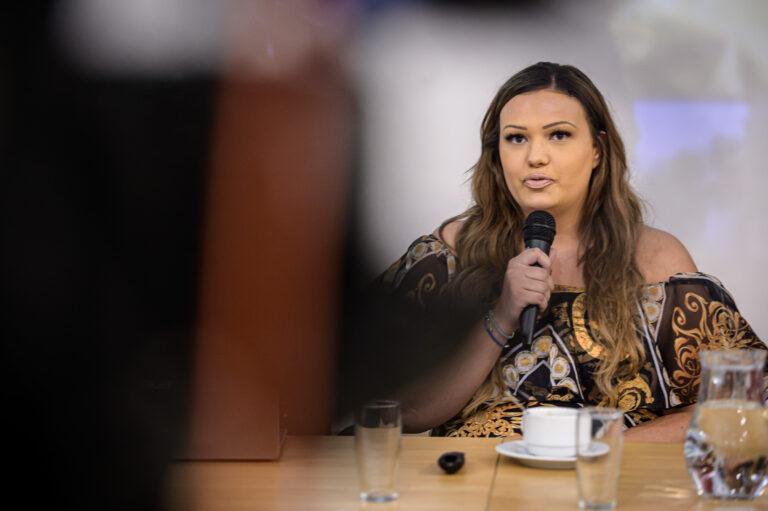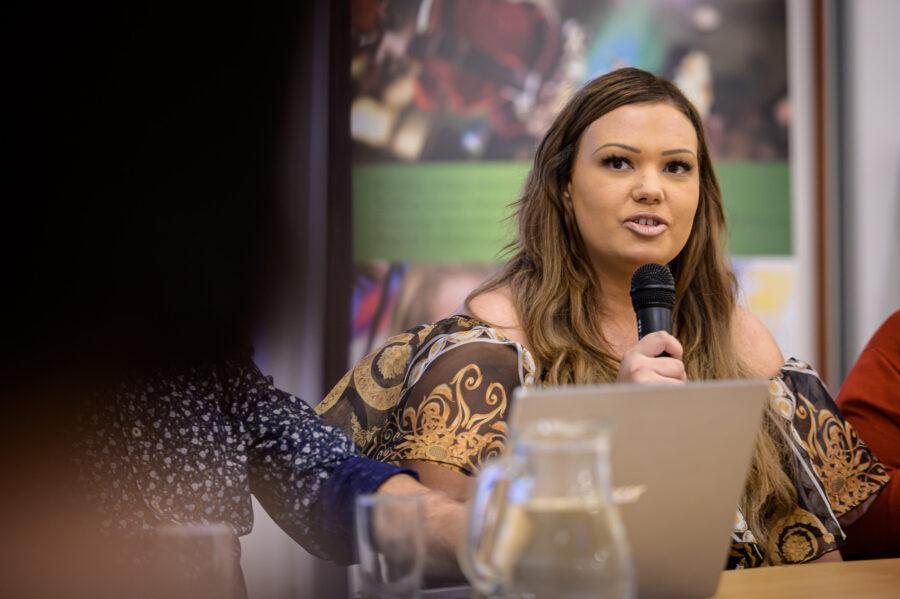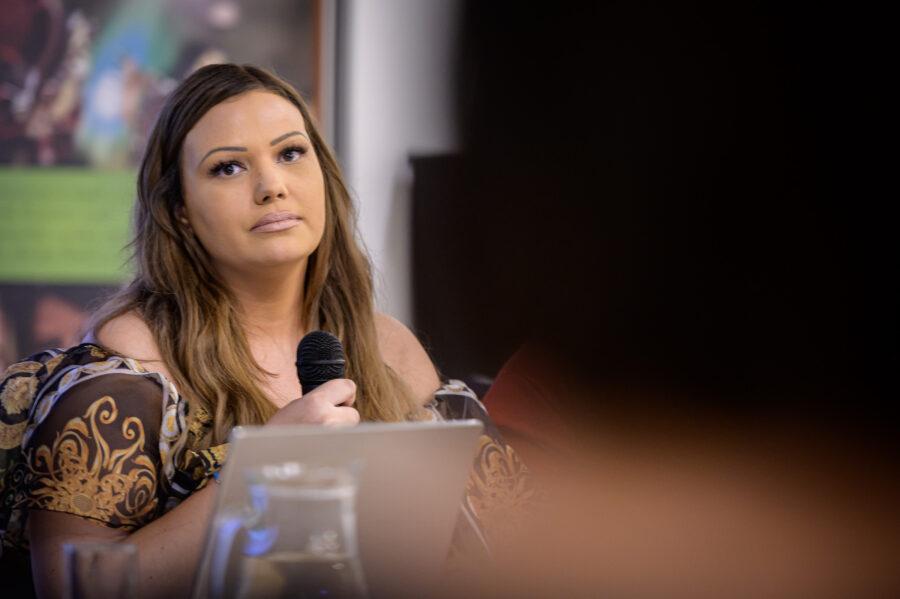Four degrees, a variegated CV and a journey to her ethnic identity: Alexandra Minzari feels a bit like an Amazon

Alexandra Minzari (34) is a young Romani woman from Hungary whose CV all but takes your breath away. She holds four degrees, including one from Oxford and another from Cambridge, speaks perfect English, French, Hungarian and Russian, and she has held many interesting jobs. She currently works for the Directorate-General for Social Affairs and Child Protection at the Hungarian Interior Ministry.
Naturally before my meeting with Szandi, as this “superwoman” introduces herself, I have a bit of stage fright. That disappears fast. Alexandra is a warm person and her openness immediately breaks through the ice as well as any cultural or linguistic barriers.
A journey to her own identity
“I feel a bit like an Amazon,” she admits to me with a smile. “I’m a single mother, I have a five-year-old daughter, and I’m raising her alone. She is an enormous motivation for me and I want to show her that women can stand up for themselves and do anything they want.”
Before the birth of her child, Szandi was clear about one thing: Whether a boy or a girl, she would tell her child the truth about her ethnic origins from an early age. So little Nalia, whose name means “Gift from God”, has known from an early age that she has Hungarian-Romani roots on her mother’s side and Russian roots on her father’s side. At the age of five she already speaks English, Hungarian and Russian.
For Alexandra, whose mother is Hungarian and whose father is Romani, her own journey to self-knowledge and finding her ethnic identity was not as direct and easy. Despite the fact that her father cannot deny his Romani heritage due to his physical appearance, his Romani origins were never spoken of in the family for a long time.
“I comprehended that something was different on the first day of school, when I was seven years old,” Alexandra says. “The teacher asked us children to put our hands in front of us on a piece of paper. I looked around and saw that the hands of the other children were much whiter than mine. I was ashamed and I quickly hid my hands behind my back.”
Her doubts and insecurities continued, though, because it was taboo to speak of such experiences in her family. “It wasn’t until I was 16 that I finally dared to ask my parents about it. I was attending college prep school, and everywhere I went I heard that I don’t look Hungarian. People asked me if I was from Turkey or Italy,” Szandi continues.
“Knowledge of the truth at that time did not make the situation any easier, though. I was afraid to tell people I am Romani, I was afraid they would judge me, because a big campaign against Romani people was underway in Hungary at that time. I had to mature, first, in order to be brave enough to acknowledge my origins,” she recalls.

Crossing the border
Her search for her own identity ignited a desire for travel. “Traveling and living abroad, for me, was always about getting to know myself, finding myself. I wanted to find out if I could do it,” she says.
At the edge of 16, when she learned of her Romani origins, she decided to spend a year in the USA. “When I announced my plan at home, the entire family was shocked,” she admits. “They could not comprehend in the least why I wanted to do such a thing and they tried to deter me from the trip. Ultimately, though, I managed to convince them all, so I think I my communications skills were pretty good already back then,” she laughs. “I also wanted to get a second piercing for earrings. My parents would not allow that, but they agreed I could spend an entire three months living with total strangers.”
Even though the beginning of her American visit was difficult and she was homesick, she soon felt like a “fish in water” in its multicultural society. “I felt an enormous sense of relief there, and a lot of strength. I’d never felt so strong before,” she recalls.
“I was also free. At home in Hungary I always had the feeling that somebody was watching me. If anybody asked me a question back home, I would immediately see its double meaning. Whether I was on the bus, at school, at work, it didn’t matter. Abroad, though, I knew that nobody was speaking about me behind my back and that what people were saying to me didn’t involve any double entendre,” she says.
Coming home
Nevertheless, Alexandra loves returning to her native Hungary after living abroad. “I’m almost certain that it’s related to my Romani genes,” she explains. “Many generations live together in Romani families. My grandparents live just two houses away from my parents on the same street, and whenever I’m abroad, I have a bad conscience and I worry about whether I’ve caused my family pain and whether they’re all ok,” she says.
She felt the very worst in 2008 and 2009, when members of the Romani minority were frequently being physically assaulted in Hungary. Six Romani people died as a result of those attacks, including a four-year-old boy. Dozens of Romani people were injured. “Back then I had enormous fear for my family. I didn’t know what to do, whether I should go home or try to get them to come to England,” she recalls.
According to Alexandra, currently such racist assaults against Romani people have moved from the public space onto social media. Instead of Romani people being attacked in public, now LGBTIQ+ people are being assaulted. “I believe that in Hungary, some officials of the Government intentionally provoke hatred for certain groups. It’s a way to distract people’s attention away from their corruption,” she says. “As one Latin proverb says – panem et circenses. Give people bread and circuses and they won’t think about what is actually happening.”
Desire for an education
Another basic subject that has determined the direction of Alexandra’s life was and still is her desire for knowledge. She believes education doesn’t just bring people power and recognition, but also the self-confidence they need.
Her first step toward a good education was her selection of a secondary school – she attended a prestigious and quite demanding college preparatory school. “It was essential for me, when I was weighing my options, that it was a Christian college preparatory school. Although my family are not believers, I have always felt an inner faith in God. I think it’s related to my Romani roots. We Romani people honor Our Lady even more than we do Jesus,” she says.
After graduating from college preparatory school with excellent grades, she applied to study International Trade Relations at Oxford, where she earned her Bachelor’s degree. She continued her studies at Cambridge. She wanted to study in England mainly because of the multicultural society lacking in Hungary. “Because I’m a maximalist, I decided that if I was going abroad, it would be to the best university,” she laughs.

Combating prejudice
After completing her studies, Alexandra returned to Budapest. “I believed I would return and ‘save the world’ in Hungary, but even though I had a degree from Oxford, I was unable to find a corresponding job at home,” she recalls. Another person might have decided to emigrate again, but Alexandra decided to get another degree. She began to study Public Administration at a state university in Budapest.
After spending years at Oxford and Cambridge among professors and students who were unbiased, she felt as if she were in an absolutely different society. “We don’t usually encounter a Lakatoš here,” one of her professors immediately said of her during his very first lecture. He was referring to the fact that it is a typical Romani surname.
Alexandra replied to him self-confidently: “My name is Alexandra Minzari, I am from a Romani family, and this is the third university at which I’ve studied.” As she tells it, “The atmosphere in the lecture hall could have been cut with a knife it was so tense. The professor didn’t bother answering, to say nothing of apologizing, he sat down behind the desk and continued his lecture.”
Romani roots
After completing her studies, Alexandra began working for the Hungarian Wrestling Union. She began in Budapest and then moved to its headquarters in Switzerland. When I ask what her relationship is to the sport, she laughs.
“I’ve always been a bit overweight, so I was never a big athlete. However, sports were very important to my father. I always admired him for how he is, his attitude to life, to other people, to work. All of that is despite the fact that he grew up practically on the street, in a Romani ghetto. He told me that he owes it all exactly to sports. He played football for a long time and learned discipline, how to be a team player, and other things that are important in life. That’s why I decided to work for a sports organization. Yes, it was exactly the kind of environment my father had always told me about,” she explains.
Last year Alexandra accepted an offer to become the Editor-in-Chief of DIKH TV, Hungary’s Romani television station. This year she left the station to work for the press department of the Directorate-General for Social Affairs and Child Protection at the Interior Ministry. As she herself says, this job is certainly not the final station of her journey.
“I feel that I need to return to my Romani roots more. We Roma live through our emotions, truthfully, and I love that. My ex-husband always said we’re crazy, because one moment we’re making love, the next we are arguing, then we’re crying…,” she laughs.
Alexandra’s father comes from the group of Hungarian Roma called the Romungro. She explains that they were musicians who used to play in the courts of the aristocracy. That is the reason nobody in her family speaks Romanes anymore – the Romungro stopped speaking Romanes at the beginning of the 17th century because, according to her, it did not seem respectable to them to speak a language that nobody else in society understood.
According to Alexandra, this aspect of being Romungro is almost a question of honor, but her friends from other Romani groups in Hungary don’t understand this attitude and condemn it. “I’d feel as if I were betraying my ancestors if I were to learn Romanes. For the Romungro Roma it is also typical that they want their children to excel at school and at work. For example, if either I or my sister didn’t get the best grades at school, we were always ashamed to tell our parents. Even though my grades at prep school were always ‘cum laude’ – with honors – that was just a matter of course for my parents, they never praised me for my successes. Their strictness motivated me to achieve,” she says.
The most important thing in the world
Even with four degrees, Szandi doesn’t have the feeling that she can stop. She has chosen the law as her next field of study. Currently, though, she has suspended those studies for one year, because little Nalia comes first.
“I live 250 kilometers away from my family now, I don’t have any help here,” Alexandra describes. She says she is not a “superwoman” who could handle a job, studying, and caring for a young child all at the same time. Spending time with her daughter is the most important thing in the world to her.
“Nalia is talkative, instead of playing with toys she prefers to sit on my lap and she wants me to tell her stories about my childhood, about my life. She’s also interested in pyramids, and the universe, and she frequently asks whether mermaids really exist,” Szandi says, brightening up.
When I ask whether she wants Nalia to be just as successful as she is, she replies: “I don’t want her to copy me. She doesn’t have to see me as an idol, I’d just like her to know that I want the best for her. My only wish is that she be happy.”
First published in Czech in the magazine Romano voďi 1/2023.